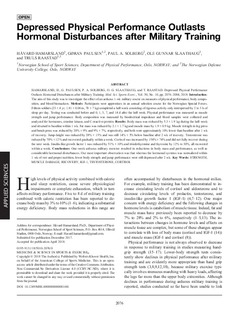| dc.contributor.author | Hamarsland, Håvard | |
| dc.contributor.author | Paulsen, Gøran | |
| dc.contributor.author | Solberg, Paul André | |
| dc.contributor.author | Slaathaug, Ole Gunnar | |
| dc.contributor.author | Raastad, Truls | |
| dc.date.accessioned | 2019-04-26T09:33:54Z | |
| dc.date.available | 2019-04-26T09:33:54Z | |
| dc.date.created | 2018-10-08T14:44:01Z | |
| dc.date.issued | 2018 | |
| dc.identifier.citation | Medicine & Science in Sports & Exercise. 2018, 50, 2076-2084. | nb_NO |
| dc.identifier.issn | 0195-9131 | |
| dc.identifier.uri | http://hdl.handle.net/11250/2595667 | |
| dc.description | This is an open-access article distributed under the terms of the Creative Commons Attribution-Non Commercial-No Derivatives License 4.0 (CCBY-NC-ND), where it is permissible to download and share the work provided it is properly cited. The work cannot be changed in any way or used commercially without permission from the journal. | nb_NO |
| dc.description.abstract | . Introduction: The aim of this study was to investigate the effect of an arduous 1-wk military course on measures of physical performance, body composition, and blood biomarkers. Methods: Participants were apprentices in an annual selection course for the Norwegian Special Forces. Fifteen soldiers (23 T 4 yr, 1.81 T 0.06 m, 78 T 7 kg) completed a hell week consisting of rigorous activity only interspersed by 2 to 3 h of sleep per day. Testing was conducted before and 0, 1, 3, 7, and 14 d after the hell week. Physical performance was measured as muscle strength and jump performance. Body composition was measured by bioelectrical impedance and blood samples were collected and analyzed for hormones, creatine kinase, and C-reactive protein. Results: Body mass was reduced by 5.3 T 1.9 kg during the hell week and returned to baseline within 1 wk. Fat mass was reduced by 2.1 T 1.7 kg and muscle mass by 1.9 T 0.9 kg. Muscle strength in leg press and bench press was reduced by 20% T 9% and 9% T 7%, respectively, and both were approximately 10% lower than baseline after 1 wk of recovery. Jump-height was reduced by 28% T 13% and was still 14% T 5% below baseline after 2 wk of recovery. Testosterone was reduced by 70% T 12% and recovered gradually within a week. Cortisol was increased by 154% T 74% and did not fully recover during the next week. Insulin-like growth factor 1 was reduced by 51% T 10% and triiodothyronine and thyroxine by 12% to 30%, all recovered within a week. Conclusions: One-week arduous military exercise resulted in reductions in body mass and performance, as well as considerable hormonal disturbances. Our most important observation was that whereas the hormonal systems was normalized within 1 wk of rest and proper nutrition, lower body strength and jump performance were still depressed after 2 wk. | nb_NO |
| dc.language.iso | eng | nb_NO |
| dc.subject | strength | nb_NO |
| dc.subject | muscle damage | nb_NO |
| dc.subject | recovery | nb_NO |
| dc.subject | IGF-1 | nb_NO |
| dc.subject | testosterone | nb_NO |
| dc.subject | cortisol | nb_NO |
| dc.title | Depressed Physical Performance Outlasts Hormonal Disturbances after Military Training | nb_NO |
| dc.type | Journal article | nb_NO |
| dc.type | Peer reviewed | nb_NO |
| dc.description.version | publishedVersion | nb_NO |
| dc.rights.holder | © 2018 The Author(s). | nb_NO |
| dc.source.pagenumber | 2076-2084 | nb_NO |
| dc.source.volume | 50 | nb_NO |
| dc.source.journal | Medicine & Science in Sports & Exercise | nb_NO |
| dc.source.issue | 10 | nb_NO |
| dc.identifier.doi | 10.1249/MSS.0000000000001681 | |
| dc.identifier.cristin | 1618771 | |
| dc.description.localcode | Seksjon for fysisk prestasjonsevne / Department of Physical Performance | nb_NO |
| cristin.unitcode | 150,31,0,0 | |
| cristin.unitname | Seksjon for fysisk prestasjonsevne | |
| cristin.ispublished | true | |
| cristin.fulltext | original | |
| cristin.qualitycode | 2 | |
